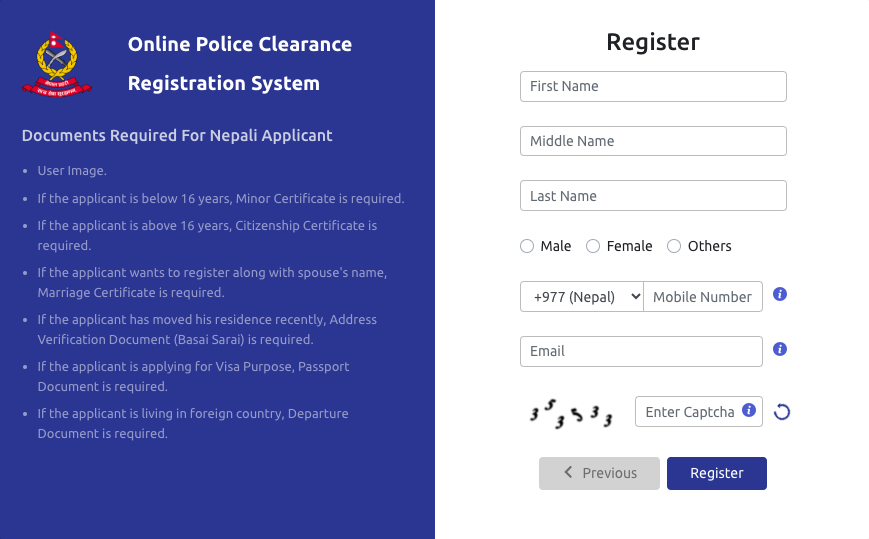Police report.pdf

A Police Clearance Report, also known as a Police Clearance Certificate (PCC), is an official document issued by law enforcement authorities of the country verifying that the applicant has no criminal record.
PCC document is typically required for purposes such as employment, immigration, visa applications, higher education, or business-related activities abroad. The PCC report assures relevant institutions that the individual does not pose any legal or security risks during his/her stay in their home country. Here in this guide, you can get information on different ways of achieving PCC from your nearest source. A sample of PCC (Police Clearance Certificate) is provided as a reference. Click the box on the right to download the PCC sample.
Follow these steps to obtain a Police Clearance Certificate in Nepal:
For quick application and collection, citizens can apply for the police clearance certificate Nepal online using the police clearance certificate online application:
1. Nepal Police Online Portal

Nepal Nagarik App
Upon applying for a PCC (Police Clearance Certificate) through these processes, you will get your PCC within 2–3 days of application.
The standard processing time for a Police Clearance Certificate in Nepal is typically 3 to 7 working days, depending on the workload. Upon application through the Nepal Police online portal and Nagarik app you may receive the soft copy document within 2–3 days in some cases you may get it within 1 day of application. Applicants are required to ensure that they provide accurate and complete documentation to avoid any delays. If the application involves verification from other districts, the process may take slightly longer.
The fee for obtaining a Police Clearance Certificate in Nepal depends upon the locality, service provider and urgency of the application. However, for administrative purposes or additional services, some extra minor costs may apply in specific cases. For free costing, you can apply through the Nepal Police online portal and Nagarik app. Upon this process, you will be charged the printing price of the soft copy into hardcopy.
In case of an urgent need for a Police Clearance Certificate, applicants may directly communicate their request to the Metropolitan Police Office or District Police Office. For urgent processing, the following steps can help:
For overseas Nepali applicants or even for persons in Nepal, applying online through the Nepal Police website can also help expedite the process.
A Police Clearance Certificate is an essential document for individuals needing proof of their criminal-free background, especially for immigration, employment, or educational purposes. While the process in Nepal is straightforward and typically free of charge, urgent cases can be expedited with valid reasons. It is essential to ensure proper documentation and timely communication with police authorities to receive the report promptly.
For any queries and questions regarding the process visit Bizz Education to consult with. We will help you understand the process and prepare the necessary documents.
A police report, also known as a police clearance certificate or a criminal record check, is an official document issued by the police or relevant law enforcement agency. Nepalese students may be required to provide a police report when applying to study at a UK university. The purpose of the police report is to verify that the student has no criminal record or history of misconduct that could pose a risk to others in the UK.
Specific courses in the UK may require Nepalese students to submit a police report as part of their application process. These courses often include those related to education, healthcare, social work, and any other fields where students may come into contact with vulnerable individuals. For example, courses such as teaching, nursing, social work, or childcare may require a police report to ensure the safety and well-being of the individuals the students will be working with during their studies and future careers.
The police report assures the university and relevant authorities that the student has no criminal background that could potentially jeopardize their studies or pose a risk to the community. It is an important document that helps maintain safety and security within academic institutions and ensures the welfare of all individuals involved in the educational process.